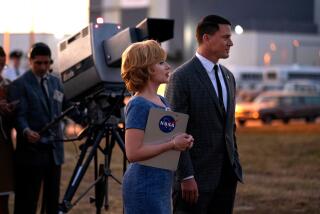CULTURE MONSTER
- Share via
If anyone doubts the difficulty of creating a play with beyond-stratospheric ambitions, consider this: It took the U.S. space program a bit more than eight years to send a crew to the moon after President John F. Kennedy’s 1961 challenge to achieve that feat -- and it has taken nearly as long for L.A. director and playwright Nancy Keystone to bring “Apollo,” her epic about spaceflight, to the launching pad for its first complete staging.
The countdown ends Friday at Portland Center Stage in Oregon, when the fully realized “Apollo” will have its premiere. In 2005, the play’s first two sections, then dubbed “Apollo [Part 1] -- Lebensraum,” premiered as part of the inaugural season of the Kirk Douglas Theatre in Culver City. By then, Keystone already had started expanding it under a grant secured by the Portland theater. The result will be a 3 1/2 -hour evening encompassing “Lebensraum,” “Gravity” (a new title for what in L.A. was the second act of “Lebensraum”) and the brand-new “Liberation.”
The 12-member cast embodies dozens of roles, including escaped 1850s slave Dred Scott, Jules Verne, Mickey Mouse, Adolf Hitler and George Wallace.
The show at the Douglas dealt with the wonder of advances in rocket science -- and the moral rot beneath, because of key roles played by German refugees who previously learned their craft on the V2 rockets the Nazis built with slave labor.
In “Liberation,” Keystone and her Critical Mass Performance Group turn to the 1960s intersection of the space race and the civil rights movement, as a member of the NASA team at the Marshall Space Flight Center in Alabama becomes the first African American to enroll, amid furor, at the University of Alabama in Huntsville.
Nancy Keystone, who founded the first version of Critical Mass in 1985, traces her inspiration to a 1990 story in The Times about Arthur Rudolph, chief architect of the Saturn V rocket that took American astronauts to the moon. He was then trying to clear his name after being forced to renounce his U.S. citizenship for using slave labor while building the V2. Keystone pulled the clipping out late in 2001 when she was scrounging for a project.
There was no hurrying it along, she said, because the Critical Mass method calls for emphasizing movement along with speaking the script, and “the way we work is very labor intensive and collaborative.”
Keystone said she has been in touch with the Center Theatre Group’s current boss, Michael Ritchie, and Diane Rodriguez, in charge of new play production, in hopes they’ll see the finished play in Portland and consider staging it in L.A. Beyond that, she says, the goal is to take the show on tour.
--
latimes.comculturemonster
For more arts coverage, visit the Culture Monster blog.
More to Read
The biggest entertainment stories
Get our big stories about Hollywood, film, television, music, arts, culture and more right in your inbox as soon as they publish.
You may occasionally receive promotional content from the Los Angeles Times.











